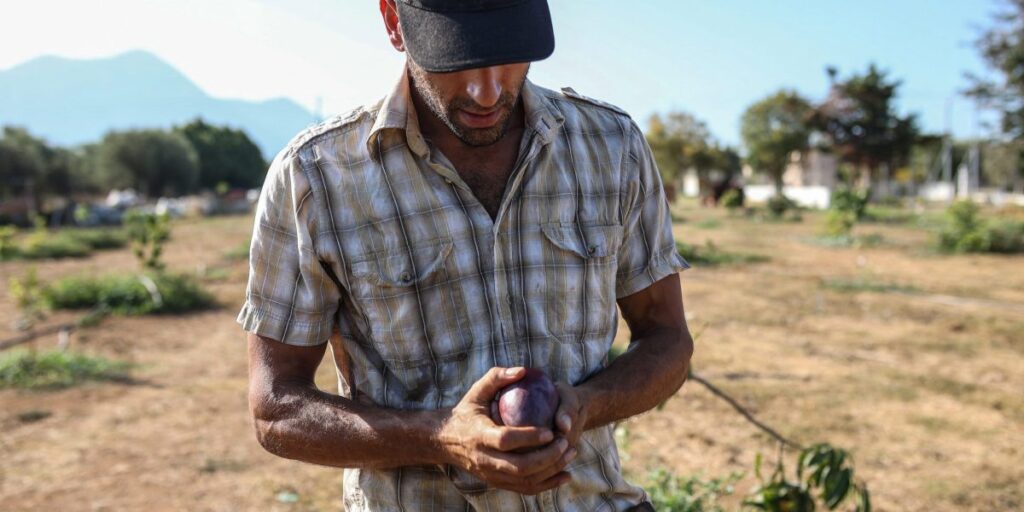
Panos Adamopoulos stirs the leaves of a bush on his farm in Kyparissia, western Greece, to discover the first mangoes about to ripen – a sign of his fight against climate change A result of a national experiment.
“There it is!” he exclaimed.
For decades, this fertile land on the coast of the Ionian Sea was known mainly for olives, watermelons and other crops.
But even Greece, a region that gets more rain than the rest of the country, is struggling with the effects of the drought.
After experiencing its warmest winter on record, Greece also experienced its hottest June and July since reliable data began to be collected in 1960.
“There is no winter,” Adamopoulos, 38, told AFP, adding that his property had not seen a drop of rain since March.
“Without water, there is no farming,” says the farmer, whose trees seem to grow directly into the Ionian Sea.
Adamopoulos currently makes most of his income from iceberg lettuce.
But as the increasingly dry season approaches, he may soon have to give up some of his lucrative but water-intensive crops, such as watermelons.
Adamopoulos is one of the few Greek growers turning to tropical fruits (mangoes, avocados, lychees, custard apples and macadamia nuts), which he says are “more resistant” to the increasingly hot weather in the Mediterranean.
Currently, he has just a few dozen mango and avocado trees on his 80-hectare (198-acre) estate.
The exotic fruits have adapted so well to their new environment that Adamopoulos now plans to plant an additional 300 trees. He said he has already received orders for the first harvest, which is due later this month.
The initiative is part of a study by Greece’s national agricultural research institute Demeter to determine whether tropical fruits can help solve the country’s looming drought problem.
This is not a miracle solution
Research director Teresa Tzatzani said the focus is “on finding new ways to combat climate change and make it work to our advantage”.
“It’s hotter all year round now, which is good for these crops,” she said.
Although avocados already grow on Crete, scientists are unsure whether the tree can adapt to conditions on mainland Greece.
Zazani noted that while mango trees require very little rainfall, the past two winters have been unusually dry.
Antonis Paraskevopoulos, the local head of agriculture at Triphylia, said such innovations were crucial to saving the industry from future climate disasters.
But for now, tropical fruits aren’t a magic solution.
The project currently has only a dozen farmers and about 10 hectares of cultivation area.
Zazzani said that while it was not intended to replace staple local products such as olives or oranges, it could complement it and he planned to expand the experiment to other regions in Greece.
Neighboring countries face similar problems. In Italy, Sicilian farmers have begun producing mangoes, bananas and papayas.
The Intergovernmental Panel on Climate Change (IPCC) estimates that the Mediterranean basin, one of the “hotspots” of climate change, will experience more frequent heat waves and droughts.
“Bad year”?
Theodoros Dimitrakakis, another Greek farmer involved in the scheme, estimates that it will take several years for tropical fruit production in Greece to become profitable.
Although the 34-year-old is enthusiastic about the experiment, he says he cannot devote all his time because the olive trees are his main source of income and require his full attention.
His village, like many in Greece, often goes without water for several hours during the day due to planned water outages.
Dimitrakakis said his olive production last year was 60% below average.
Although Dimitrakakis was an environmental activist during college, he admits that he only recently realized that climate change would soon affect him.
He now hopes to convince other local farmers, some of whom prefer to think this is just a “bad year”.

